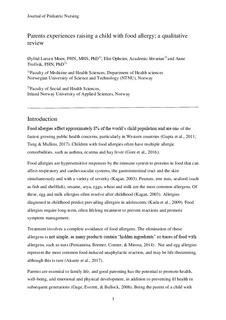| dc.contributor.author | Moen, Øyfrid Larsen | |
| dc.contributor.author | Opheim, Elin | |
| dc.contributor.author | Trollvik, Anne | |
| dc.date.accessioned | 2020-02-19T13:04:02Z | |
| dc.date.available | 2020-02-19T13:04:02Z | |
| dc.date.created | 2019-06-21T12:17:12Z | |
| dc.date.issued | 2019 | |
| dc.identifier.citation | Journal of Pediatric Nursing : Nursing Care of Children and Families. 2019, 46 e52-e63. | nb_NO |
| dc.identifier.issn | 0882-5963 | |
| dc.identifier.uri | http://hdl.handle.net/11250/2642607 | |
| dc.description | The article has been peer-reviewed, but does not include the publisher’s layout, page numbers and proof-corrections. Citation for the published paper: Moen, Ø., Opheim, E. & Trollvik, A. (2019). Parents Experiences Raising a Child with Food Allergy; A Qualitative Review. Journal of Pediatric Nursing, 46, E52-E63 DOI:10.1016/j.pedn.2019.02.036 | nb_NO |
| dc.description.abstract | Problem:Food allergies are one of the fastest growing public health concerns without a cure, affecting approxi-mately 8% of the world's child population. Being the parent of a child with allergies may lead to concerns, and af-fect everyday life in the family. The aim was to synthesize and describe parents' experiences of living with foodallergies in families when one of the children has a food allergy.Eligibility criteria:A systematic search using subject terms and text words was performed in Cinahl (Ebsco),Swemed+, Medline (OVID) and Scopus in October 2017. The search was limited to parents with children and ad-olescents, for the years from 2006 to October 2017.Sample:One hundred and forty articles were screened and 24 were included.Results:A meta-summery of the results from the included studies were conducted. The parents lived in fear, aftertheir child had theirfirst reaction and had become allergic, a life threatening experience. They tried to live an or-dinary family life and parents had to learn how to be one-step ahead and understand early signs. The family's so-cial life was also influenced. Parents asked for support and information from health professionals and moreknowledge and skills increased parents' manageability.Conclusion:Parents need support and a seamless encounter with health professionals, with multidisciplinary col-laboration and knowledge sharing to develop the parents' self-efficacy.Implications:Health professionals must provide information and support parents on their path through thehealth-care system in having a child with a food allergy. | nb_NO |
| dc.language.iso | eng | nb_NO |
| dc.title | Parents experiences raising a child with food allergy; A qualitative review | nb_NO |
| dc.type | Journal article | nb_NO |
| dc.type | Peer reviewed | nb_NO |
| dc.description.version | acceptedVersion | nb_NO |
| dc.source.pagenumber | e52-e63 | nb_NO |
| dc.source.volume | 46 | nb_NO |
| dc.source.journal | Journal of Pediatric Nursing : Nursing Care of Children and Families | nb_NO |
| dc.identifier.doi | 10.1016/j.pedn.2019.02.036 | |
| dc.identifier.cristin | 1706742 | |
| cristin.unitcode | 209,7,0,0 | |
| cristin.unitcode | 209,4,1,0 | |
| cristin.unitname | Administrasjonen | |
| cristin.unitname | Institutt for sykepleiefag | |
| cristin.ispublished | true | |
| cristin.fulltext | postprint | |
| cristin.qualitycode | 1 | |
